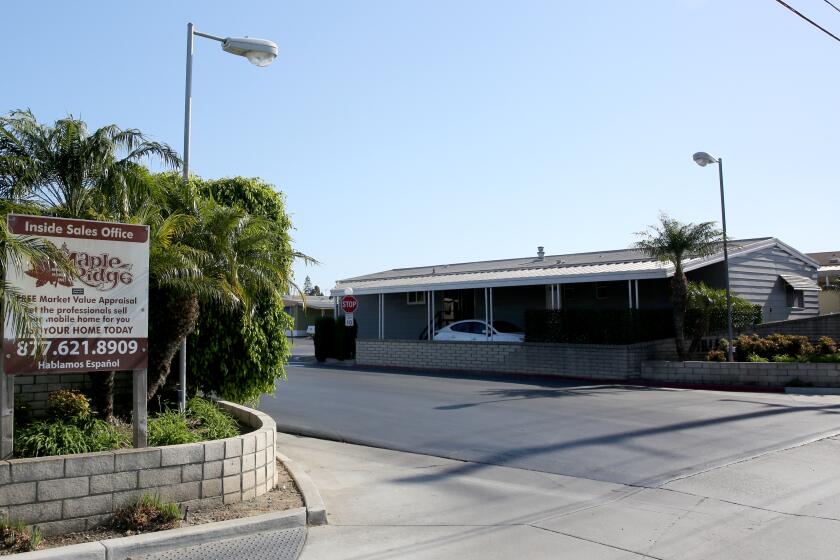State sticks with El Morro plan
- Share via
Mary A. Castillo
The California Department of Parks and Recreation’s conversion
plans for the El Morro mobile home park were not swayed by the
redevelopment plan announced by the El Morro Community Assn. last
week.
“We wish to turn this into a coastal campground,” parks spokesman
Roy Stearns said. “This is the last remaining place that we know of
in the Los Angeles Southern California area where there could be a
coastal campground.”
Stearns argued that the plan for building affordable housing and a
vacation hostel posed by the current mobile home park residents was
simply unacceptable to the state.
“I think if we had to have affordable housing in this state park
or in any state park, the majority of Californians would be very
unhappy because it denies the state park to the public,” he said.
A day before the community association announced its plan, the
state parks department released a statement listing some of the
changes it made to its plan outlined in the final Environmental
Impact Report. Among the changes included the increased height of the
boundary between the campsite and El Morro Elementary School and
restricting campfires during normal school hours.
He denied the association’s claims that the budget for Crystal
Cove State Park is hamstrung by the state’s budget crisis. Stearns
indicated that the development’s funds are locked in place by
Proposition 12, the Parks Bond Act of 2000 and were included in the
governor’s 2000-01 budget.
The association promised $10 million generated from an extended
30-year lease.
“Economically, our plan could be a very good thing for this
community,” he said.
State parks host about 85 million visitors a year and bring in
$2.6 billion annually in the communities around state parks.
Elisabeth Brown reiterated Laguna Greenbelt Inc.’s support of the
state’s plan. She felt that that the state parks department had been
responsive to community input. The greenbelt opposed the placement of
a signal at Pacific Coast Highway near El Morro Creek, which the
state promised not to install.
“It should be very interesting to see the re-greening of El Moro
Canyon,” she said. “Under this plan when the day use people go home,
very little will be going on down there in the canyon and it will
allow animals to go out.”
But she blasted the community association for referencing the
greenbelt and the State Parks Foundation in its announcement.
“I think these folks have a lot of nerve coming up with a plan for
land they don’t own,” she said.
Former councilman and spokesman for the association Paul Freeman
indicated that the community association purposefully did not consult
with either organization because it did not want to create a conflict
of interest on the support of the park. In addition to the $10
million that would be earmarked to the park, the proposal also offers
$1 million each subsequent year to the two environmental groups.
If they don’t want the money, he said, they would gladly find
other groups who would use it to protect and preserve Laguna’s green
space.
“This is not a choice between open space and development,” Freeman
said. “This is a transitional plan from what [the park] is now to
whatever it will be over time under the direction of State Parks.”
Freeman likened the controversy over El Moro to the purchase of
Laguna Canyon in the early 1990s and the development of Treasure
Island. He felt that the community should join in a debate and use
the opportunity to not only create affordable housing, but also
generate dollars for Crystal Cove State Park and local green space.
He said the City Council could be a platform to take the proposal
to state parks.
However, at the City Council meeting Tuesday night, Councilman
Wayne Baglin asserted that the council had not participated in the
community association’s proposal and expressed concern upon reading
statements from union representatives and city employees in the
community association’s release.
“We have not supported it, and no city staff had any involvement
at all,” City Manager Ken Frank said. “We’re very much in support of
the state plan and not in extending leases.”
The El Morro mobile home tenants are scheduled to move out in
December 2004 before construction officially begins in early 2005.
The community association hopes to bring its proposal before the City
Council this spring.
* MARY A. CASTILLO covers education, public safety and City Hall.
She can be reached at mary.castillo@latimes.com.
All the latest on Orange County from Orange County.
Get our free TimesOC newsletter.
You may occasionally receive promotional content from the Daily Pilot.









